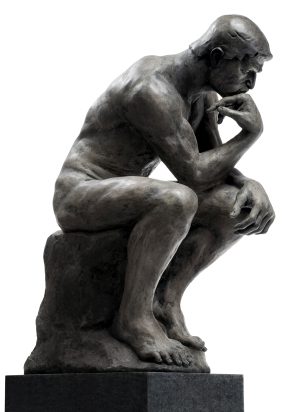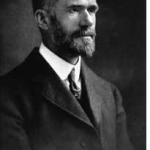 Immanuel Kant’s famous exhortation “Have courage to use your own reason!” (“Sapere aude!”) stands out as a defining statement of the Enlightenment. For Kant, daring to thinking for oneself is enlightenment. In his catalytic essay “What Is Enlightenment?” he calls on his readers to free themselves from “self-incurred…tutelage,” where they take their direction from others. (See Immanuel Kant, “What Is Enlightenment?” in Kant Selections, ed. Lewis White Beck, The Great Philosophers series {New York: Macmillan Publishing Company, 1988}, p. 462). In this work, along with a variety of other projects, including his three great critiques (of pure reason, practical reason and judgment), Kant outlines what is entailed for him by rigorous and sound thought.
Immanuel Kant’s famous exhortation “Have courage to use your own reason!” (“Sapere aude!”) stands out as a defining statement of the Enlightenment. For Kant, daring to thinking for oneself is enlightenment. In his catalytic essay “What Is Enlightenment?” he calls on his readers to free themselves from “self-incurred…tutelage,” where they take their direction from others. (See Immanuel Kant, “What Is Enlightenment?” in Kant Selections, ed. Lewis White Beck, The Great Philosophers series {New York: Macmillan Publishing Company, 1988}, p. 462). In this work, along with a variety of other projects, including his three great critiques (of pure reason, practical reason and judgment), Kant outlines what is entailed for him by rigorous and sound thought.
From a very different vantage point, John’s Gospel reveals Jesus calling on his listeners to dare to think for themselves. Jesus tells those who have believed in his message that “If you abide in my word, you are truly my disciples, and you will know the truth, and the truth will set you free” (John 8:31-32; ESV). From what follows, we see that many of those who heard these words took offense: they did not see themselves as in bondage to anyone or anything. How ironic in that his own people were in bondage to the Romans; moreover, Jesus, as recorded here, will go on to argue that many of his listeners cannot bear to hear his word and live it out because they are enslaved to the Devil: their will is to carry out their father the Devil’s desire to murder—him (John 8:39-47; cf. 8:57-59). They are under the Devil’s tutelage. What about me? What about you? How do we respond to Jesus’ word?
In the very next chapter of John’s Gospel, we find that the leaders of the religious establishment are blind to who Jesus is and what he does whereas the man born blind whom Jesus heals comes to believe in Jesus and side with him even though he gets kicked out of the synagogue as a result of his new allegiance. Such an allegiance is costly; even the man’s own parents won’t come clean and speak the truth about the matter but leave it to their son to speak and put him at risk; they are fearful of being kicked out of the synagogue and ostracized from their culture (See John 9:1-41).
Kant’s essay and John’s Gospel reflect the conviction that people must dare to think for themselves rather than allow others to think for them. Such courage leads to knowledge. Knowledge is liberating. In contrast, fear of one’s group or one’s leadership base is enslaving. While it is true that knowledge is power because enlightenment frees one to gain mastery of one’s situation, it is also true that those in power (in every age) dictate what is true or knowledgeable (hence, the expulsion of the man healed of blindness from the synagogue for his truthful testimony of Jesus); even when they are wrong, their power is knowledge.
We find in Kant’s corpus an emphasis on right reasoning that is bound up with his Copernican Revolution and critical philosophy. Such right reasoning is liberating. One does not submit oneself to a person’s direction, but to the direction of transcendent reason. For Kant, Jesus functions as a symbol of a rational principle or ideal rather than the reality itself. It is striking in this regard that Kant never referred to Jesus by name, but rather as the great moral teacher. For Kant, the essential thrust of Jesus’ teaching can be extracted from his particular history; he functions as a symbol for a transcendent truth and value, which every human can attain independently of him. (See Immanuel Kant, Religion within the Limits of Reason Alone (New York: HarperOne, 1960); see also W. Barnes Tatum’s discussion in Jesus: A Brief History {Oxford: Wiley-Blackwell, 2009}, pp. 124-125). Not so for John’s Gospel. Jesus’ tutelage is the only tutelage from which one must never free oneself if one really wishes to be free. As you dare to think, what do you think about truth and about John’s claim about Jesus as the definitive embodiment of truth? And what do you make of his claim that by holding onto him you and I are truly set free?
This piece is cross-posted at The Christian Post.
















